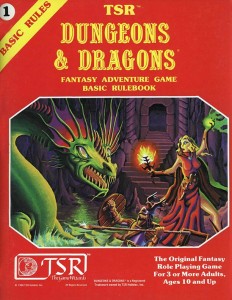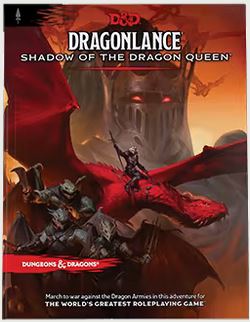A Level Playing Field
By The Warden
 Hmm, what is the biggest thing that’s happened this past week in the world of roleplaying games? C’mon, how many of you figured out there’d be something about the old D&D modules, supplements, and settings returning to official PDFs would be the focus on this week’s Under the Hood? If you were hoping to find a break from every other blog talking about it, I’m afraid you’re going to be disappointed, but I’m going to make it my mission to give you a reason to care and get excited.
Hmm, what is the biggest thing that’s happened this past week in the world of roleplaying games? C’mon, how many of you figured out there’d be something about the old D&D modules, supplements, and settings returning to official PDFs would be the focus on this week’s Under the Hood? If you were hoping to find a break from every other blog talking about it, I’m afraid you’re going to be disappointed, but I’m going to make it my mission to give you a reason to care and get excited.
Because I sure am.
Not because it’s finally a chance to grab copies of old favourites (this is not the first time D&D PDFs have been officially sold through OneBookShelf, after all). Aside from some old Ravenloft and Dark Sun material, most of my memorable gaming material is already sitting on my bookshelf and I don’t play old-school D&D anymore. Even then, I never played any of the classic modules (from 1974 until 1989, that is) and even then we ran through a lot of homebrew settings and adventures.
My excitement stems from what this means for independent publishers and game everywhere. This, my friends, is vindication.
A LOOK BACK DOWN TROLLING LANE
Controversy hit the fan three years ago when Wizards of the Coast withdrew their PDF selection of D&D and other associated products from online sales with such speed, they left streak marks on RPGNow’s front page. Timing of the rapid PDF pull and a lawsuit slapped against a small handful of data pirates led all of us to assume the two actions were hand-in-hand and jumped on the bandwagon to grab what was in our wish lists and shopping carts before it was “too late.” (Check out this 2009 interview with Greg Leeds by EN World on the event.)
Since then, those in charge of D&D‘s brand would come and go, proclaiming a strategy was in place to bring PDFs back to their fans. When the tease was leaked over this past weekend (and the announcement at the Dungeons & Dragons Keynote Address), anticipation grew, but was not exactly out of the blue as re-releases of out-of-print hardcopy editions were all the rave among collectors. It was a relief to know things were getting back to normal.
Not only did they go back to normal, it’s as if the only thing changed is the extra website. Previous PDF exporter for D&D products, OneBookShelf and their respective websites, DrivethruRPG and RPGNow (along with Wargame Vault, DriveThruComics, etc.) is once again providing all the software and programming to make this happen, now with an exclusive site for D&D products, dndclassics.com. You can still find the current catalogue on all other OBS sites and every one of them has a D&D product at the top of the Best Sellers list.
So why does this have me excited? I shouldn’t be as I’m not a huge fan of Disney tactics and this repeat shift in position could be trolled as a Disney-style tactic to re-release “new editions” of previous products; yank them off the shelf for a few years, and then re-release them again to an updated audience. But I’m not.
I’m excited because it turns out the most effective strategy for maintaining and sustaining a major brand in today’s market involves selling PDFs just like the rest of us. While independent designers and publishers are scrambling to make their games look just like the big players’ weakest products, they’re scrambling to make their oldest material look as fresh and original as ours. In other words, we’re doing something right.
NO WINNERS AND NO LOSERS
The build-up of tablets and e-readers was not an explosive phenomenon since WotC pulled their PDFs in 2009; it was a growing concern and the reaction amongst many major publishers in all print industries was to hold back and prevent such a medium from rising into a featured aspect of the market. Just like the music business with mp3s, their efforts failed and now they’re eager to look proactive and join the club after refusing to pay their membership bills. Their return to online sales was inevitable, but stepping right back into the same ring as three years ago was quite a shocker.
The official position on the PDF shift was as follows:
“The piracy became a substantial concern when we saw thousands of copies of our recently released Player’s Handbook 2 being downloaded illegally within hours of its release. We cannot share sales figures, but I can tell you that we conservatively estimate the ratio of illicit downloads to legally purchased copies was 10:1.”
Wizards of the Coast and their marketing people no doubt did their homework and looked into many possibilities, including a rumoured concept of including it through their DDI subscription. They must have looked at all feasible options, including running their own site on their own servers, similar to Paizo and they went with what’s already worked for over a decade. Odds are very good the particulars of this new agreement may be unique (like a larger percentage going towards WotC over the previous contract), but it’s also just as likely the same. According to OBS statements since the previous separation, overall sales on all sites took a temporary dip before rising up strong and surpassing performances while WotC was a regular client.
With tablets and Kindles as the top sellers of the Christmas holidays, there’s no room or time for publishers of any genre to ignore the role of digital products in any print market, roleplaying games included, and when you’re trying to play catch-up on a fast-growing medium, the best way to change course and regain speed is to follow the other ships.
It’s a decision with winners and without losers. Wizards of the Coast looks good for reversing an unpopular decision without looking like goons for caving in (they are, after all, working on bringing back all fans of D&D from every genre and generation) and it solidifies the hard work of every other struggling designer and publisher out there with an idea. Think about it, someone’s shopping cart could have a copy of your PDF mixed in with their download of Temple of Elemental Evil. Aside from being hired on at WotC, that’s about as good as it can get, right?
OK, THERE MAY BE SOME WINNER AND LOSERS…
This viewpoint is probably not shared and for every happy fan there’s an anxious publisher watching them lose top spot on the Top Sellers list posting about how Big Players don’t need the same exposure we do, and so forth. It’s an entirely valid point and a concern I share, even if it is muted by comparison. The kicker about that statement is that it’s beyond our control.
I’ve sold my first game, Killshot, on three distinct sites: OneBookShelf (divided evenly between DriveThruRPG and RPGNow with a couple of affiliate sites tossed on for flavour), Paizo, and my own online sales site. 97.65% of all paid sales have come through OBS sites. ‘Nuff said. If I want this thing to sell, it’s going on the same site as everywhere else because that’s where the bulk of PDF sales are going on. Are the Big Players as dependent as I am for PDF sales? No, but if I were in the same shoes, I’d be eager to cash in on what Matthew Sprange calls “The Great PDF Roundup.”
The current RPG market is miserable. There really is no other word for it. I was talking to the owner of a certain well known RPG company just a little while ago, and he mentioned that he had sold a few hundred of his latest release. We agreed it was a good total in this day and age for the average RPG product (not saying his book was average but… oh, you get the point!). Then he dropped the bombshell; he had reliable information that his book had outsold the latest supplement of a very well known, not to mention market-leading, game.
If the top tier games are selling at these levels, then something is seriously wonky in the market.
That is not to say that good sales are impossible. Publishers can still get into decent four figure ranges on new releases (our own 2300AD is a good example). But it is not the norm. Most RPG books these days are being bought by just a few hundred people, no more. Think on that for a moment.
On the other hand, RPG sales among PDFs, spearheaded by DrivethruRPG.com, are fairly booming. Which, of course, brings us to the inevitable question; is digital taking over?
From Matthew Sprange, President, Mongoose Publishing
State of the Mongoose 2012
The past year has seen tremendous strides for independent publishing in both availability and technology. Going off last week’s OBS To Sellers list, there is Dungeon World, Marvel Heroic Roleplaying, BareBones Fantasy, and Hero Kids rising from near obscurity to become some of the dominant games available. It was only a matter of time before anything with the D&D brand was going to start grabbing attention and that time was going to be sometime this year or early into 2014. There was no avoiding it, so we’d best embrace it. Because if they’re learning something from us, there’s definitely something we can learn from them.


